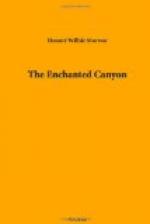“Diana, you were wrong. No matter how strenuous the work is, you are never out of the background of my thoughts. But at least I am having surcease from grieving for you. I have had no time to dwell on the fact that you cannot belong to me. I am afraid to come out of the Canyon. Afraid that when these wonderful days of adventure are over, the knowledge that I must not ask you to marry me will descend on me like a stifling fog. As for Brown! Diana, why not let me kill him! I’d be willing to stand before any jury in the world with his blood on my hands. What he has done to me is typical of Brown and all his works. He is unclean and clever, a frightful combination. Consider the class of readers he has! The majority of the people who read Brown, read only Brown. His readers are the great commonalty of America, the source, once, of all that was best in our life. Brown tells them nasty stories, not about people alone, but about systems; systems of money, systems of work, systems of government. And because nasty stories are always luscious reading, and because it is easier to believe evil than good about anything, twice every day, as he produces his morning and evening editions, Brown is polluting the head waters of our national existence. I say, why not let me kill him? What more useful and direct thing could I do than rid the nation of him? And O Diana, when I think of the smut to which he coupled your loveliness, I feel that I am less than a man to have hesitated this long.”
Enoch closed the book, replaced it in the bag, and sat for a long hour staring into the fire. Then he went to bed.
CHAPTER XI
THE PERFECT ADVENTURE
“Who cares whether or not my hands are clean? Does God? Wouldn’t God expect me to punish evil? God is mercilessly just, is He not? Else why disease and grief in the world? If you could only tell me!”—Enoch’s Diary.
It was nipping cold in the morning. Ice encrusted the edges of the little brook. But by the time breakfast was finished, the sun had appeared over the distant mountain peaks and the long warm rays soon brought the thermometer up to summer heat. Milton expounded his program at breakfast. Jonas was to keep the camp. Enoch and Milton were to climb to the rim for topographical information. Harden was to look for fossils. Agnew and Forrester were to make a geological report on the strata of the section.
Jonas was extraordinarily well pleased with his assignment.
“I’m going to finish painting the Na-che,” he said. “Mr. Milton, have you got anything I can mend the tarpaulins with that go over the decks?”
“Needles and twine in the bag labeled Repairs,” replied Milton. “How about giving the Ida the once over, too, Jonas.”
“All right! If I get around to it!” Jonas’ manner was vague.
“Can’t love but one boat at a time, eh, Jonas?” asked Enoch.




